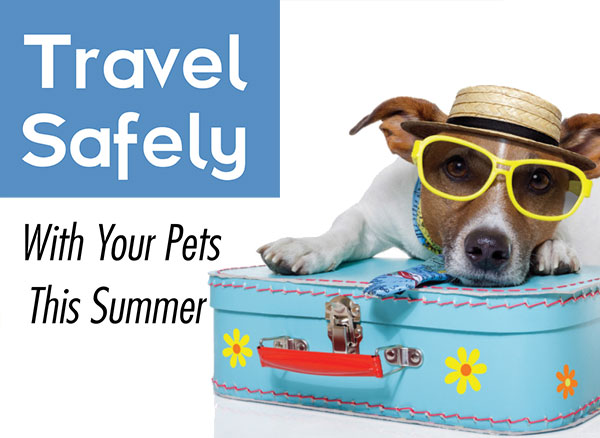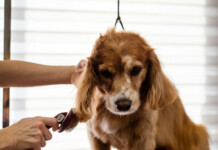
By Carrie O’ Brion
Millions of Floridians are expected to travel this summer, and doctors from BluePearl Veterinary Partners are offering tips for keeping your furry friends safe if they are hitting the road with you.
“Travel can be stressful for both pets and people,” said Dr. Jennifer Welser, chief medical officer for BluePearl. “We hope these tips will make your trip a more enjoyable experience for everyone, whether they have two legs or four.”
- Never leave your pet unattended in a car, even with the windows cracked. If it’s 85 degrees outside, the temperature inside a car can rocket to 120 degrees in a matter of minutes.
- Always make sure you have plenty of your pet’s medication packed. Take extra to be on the safe side.
- Pack a first aid kit for your pet: tweezers to remove ticks, bandaging material for any cuts, hydrogen peroxide, etc.
- If your pets have any ongoing medical conditions, take a copy of their medical records with you.
- Identify the nearest animal emergency hospital to where you are staying and have the phone number handy.
- Make sure your pet’s heartworm and flea prevention medications are current.
- Don’t feed a large meal before leaving; simply allow periodic snacking.

- Carry collapsible bowls for food and water.
- Make sure that dog tags are clearly visible because people are more likely to catch pets if they can return them to the owner. Having your pet get a microchip for identification is a good step, too.
- If your pet has implants (e.g. plates or screws from orthopedic surgery), and he or she will be flying, you should bring a note from your veterinarian.
- When flying, be sure to have wheels for your carrier. Even a 10-pound animal can get heavy when carried in a shoulder carrier walking through a long airport terminal.
- If your dog is one of the 17 percent who get sick when traveling, ask your veterinarian about an anti-vomiting medication called Cerenia. Dogs get motion sickness either because they are anxious while traveling or because their balance is affected by movement. In either case, Cerenia blocks vomiting signals, which prevents dogs from getting sick.
Special Considerations for Kitty
- Try spraying “Feliway,” a synthetic feline facial pheromone, in the carrier about 30 minutes
 before leaving to help calm the feline traveler. Placing some catnip in the carrier may also serve the same purpose.
before leaving to help calm the feline traveler. Placing some catnip in the carrier may also serve the same purpose. - Don’t use tranquilizers or sedatives in cats for travel due to potential complications such as hypotension or paradoxical hyper-excitability.
- Always keep your cat confined in a carrier while traveling. A frightened feline can easily escape through an open car window or door without anyone noticing.
- Be sure to carry some moistened and dry paper towels and plastic bags for potential carrier accidents.
About BluePearl Veterinary Partners
BluePearl Veterinary Partners employs 2,400 team members, including more than 500 veterinarians. BluePearl hospitals offer referral-only, specialty care services and most offer 24- hour emergency care. BluePearl does not provide primary care. The company is one of the world’s principal providers of approved veterinary residency and internship programs. BluePearl also participates in clinical trials that investigate the effectiveness of new veterinary drugs and treatments, providing pet families access to cutting-edge medicine that is not yet commercially available. BluePearl is headquartered in Tampa.
hour emergency care. BluePearl does not provide primary care. The company is one of the world’s principal providers of approved veterinary residency and internship programs. BluePearl also participates in clinical trials that investigate the effectiveness of new veterinary drugs and treatments, providing pet families access to cutting-edge medicine that is not yet commercially available. BluePearl is headquartered in Tampa.















